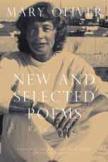Connected to the World
In this second collection by Pulitzer Prize and National Book Award winner Mary Oliver, containing 42 new poems, the contents run in reverse chronological order, the most recent ones first, just the way a curriculum vitae starts with the latest accomplishments. Publishers must fear a flagging of interest if the older stuff comes first, but with Mary Oliver they have no cause to worry. Her poetry has remained totally consistent in its patterning, in the elegance of its diction and in its field of interest.
Mary Oliver admits to her own consistency in the poem, “Am I Not Among the Early Risers” (1997), in which the rhetorical questioning of Walt Whitman mixes with the woodsy absorption of Thoreau: “Here is an amazement—once I was twenty years old and in every motion of my body there was a delicious ease, / and in every motion of the green earth there was a hint of paradise, / and now I am sixty years old, and it is the same.”
Oliver’s stated preference is to focus intently upon “all things brash and rustic.” She keeps the ambiguous and conflict-ridden world of the city out of her frame. She lives in and for her natural surroundings, a person “hot with the joy of this world, and filled with praise” (“Circles”). In “Have You Ever Tried to Enter the Long Black Branches,” she challenges her readers to imagine themselves into this realm at their doorstep. The world outside has a daily and nightly drama. She watches the owl come in the dark “to sit/ in the black boughs of the apple tree/ and stare down/ the hook of his beak” for some soft furry life venturing onto the snow, and her heart does not know which side to take, which party to root for (“The Owl Who Comes”).
In Volume One of her New and Selected Poems, 1992, Mary Oliver showed her penchant for parable-making. The little adventures and surprises we run into outdoors yield their lessons. Aesop and Pliny recognized and traded on this millennia ago. Oliver puts it this way: “Every day I walk out into the world/ to be dazzled, then to be reflective” (“Long Afternoon at the Edge of Little Sister Pond”). This world of sky, woods and seashore is not without eros or death, as she shows abundantly. It contains the mountain lion she ran into “whose flames leaped in her eyes” (“Mountain Lion on East Hill Road, Austerlitz, N.Y.”). The drama is mostly smaller, as when she releases a baby raccoon from a trap and runs away from the trapper’s approaching footsteps.
As to poetic style, Mary Oliver favors symmetrical construction, like the parallel phrasing that we associate with rhetoric (and with Walt Whitman) or the breaking down of extended sentences into small quatrains. Her writing is not strong on musicality or experiments with form. In this volume she presents many of her poems as prose paragraphs. Others too could have received this treatment, except that we attend better to units of phrasing, we listen to them more attentively, when we find them broken up line by line.
Oliver’s powers of observation are keen, with occasional flashes of metaphor, like “the honeycomb of the corn’s beautiful body” (“Little Summer Poem Touching the Subject of Faith”) and “the prayers that are made/ out of grass” (“Mindful”).
Mary Oliver’s poems bear out her own claim: “I think there isn’t anything in the world I don’t admire” (“Hum”). And she can add: “Once in a while, I have chanced, among the quick things, upon the immutable” (“Have You Ever Tried to Enter the Long Black Branches”). It happens with her more than once in a while. In this judicious collection, the reader will find each of the poems carries a hidden urging: “Read on.”
This article also appeared in print, under the headline “Connected to the World,” in the December 19, 2005, issue.








